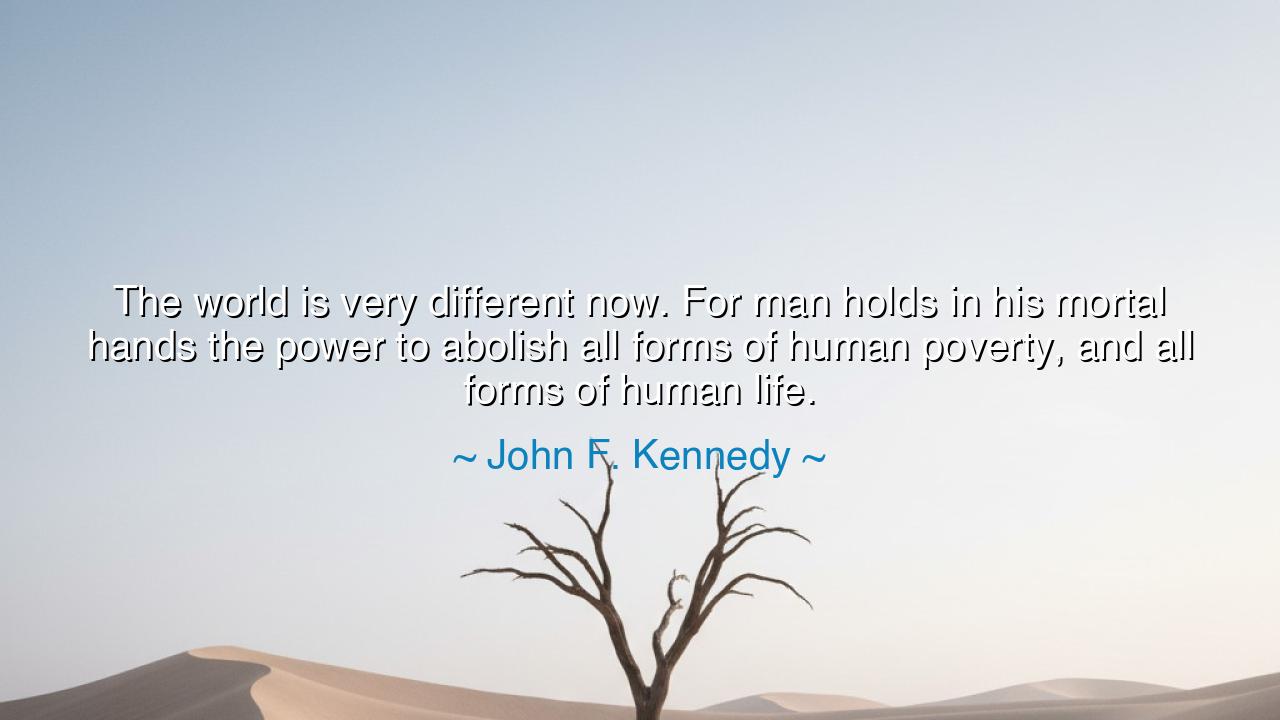
The world is very different now. For man holds in his mortal
The world is very different now. For man holds in his mortal hands the power to abolish all forms of human poverty, and all forms of human life.






Hear the solemn words of John F. Kennedy, spoken with the gravity of a man standing at the crossroads of history: “The world is very different now. For man holds in his mortal hands the power to abolish all forms of human poverty, and all forms of human life.” These words, drawn from his inaugural address in 1961, echo like a trumpet through the ages. They remind us that the progress of humanity has granted us powers once reserved for the gods—powers both creative and destructive, merciful and apocalyptic.
Kennedy spoke at the height of the Cold War, when the shadow of nuclear weapons hung heavy upon the earth. For the first time in history, mankind had devised machines capable of ending civilization in an instant. At the same time, science and technology had advanced enough to promise cures for hunger, disease, and suffering. It was a moment of both peril and promise, a balance so fragile that the world itself seemed to hang upon the decisions of a few mortal hands. His words captured that paradox: humanity had reached a summit where it could either save itself or destroy itself.
The first part of his declaration points to the power to abolish poverty. In the mid-twentieth century, new technologies in agriculture, medicine, and industry offered the possibility of lifting billions from hunger and despair. The Green Revolution, led by scientists like Norman Borlaug, was already beginning to transform barren fields into fertile lands, feeding multitudes that once starved. The tools of abundance had been given to mankind, and Kennedy believed that with wisdom and cooperation, poverty could one day be ended.
Yet the second part strikes with darker force: the power to abolish life. With the detonation of atomic bombs in Hiroshima and Nagasaki, humanity had entered a new age. The very species that once cowered before thunder now commanded fire capable of consuming the earth. The arsenals of the superpowers grew, stockpiles vast enough to kill not thousands, but millions, even billions. For the first time in history, the survival of mankind no longer depended only on nature’s fury—it depended on human restraint.
This dual power—to save and to destroy—reveals the double edge of all human progress. The same science that heals can also harm; the same machine that feeds can also kill. Kennedy’s words remind us that our greatest danger lies not in our lack of strength, but in our abundance of it. The world is very different now precisely because we have become custodians of powers that surpass our wisdom. To hold such power is both triumph and terror.
The lesson, O seeker, is that power is not enough. What matters is the will to use it rightly. You, too, hold in your hands the small versions of this choice: to build or to break, to heal or to harm, to lift others up or to cast them down. Nations, like individuals, reveal their soul by how they wield their gifts. To abolish poverty is an act of love; to abolish life is an act of despair. The path you choose will shape the destiny of generations.
Practical steps follow: use your resources, however great or small, to uplift rather than destroy. Support efforts that feed the hungry, that heal the sick, that bring peace rather than war. Be mindful of the technologies you create or consume, and ask whether they bring humanity closer to justice or to ruin. Above all, remember that your hands, like those of all mankind, carry power—perhaps not to end worlds, but to shape the lives around you for better or worse.
Thus, remember Kennedy’s warning and hope: “Man holds in his mortal hands the power to abolish all forms of human poverty, and all forms of human life.” Let it remind you of the sacred responsibility that comes with strength. For the world is very different now, and in this difference lies the ultimate choice: whether humanity will use its power to bless the earth with abundance, or to scorch it with fire and silence. The answer lies not in destiny, but in the hands of men.






AAdministratorAdministrator
Welcome, honored guests. Please leave a comment, we will respond soon